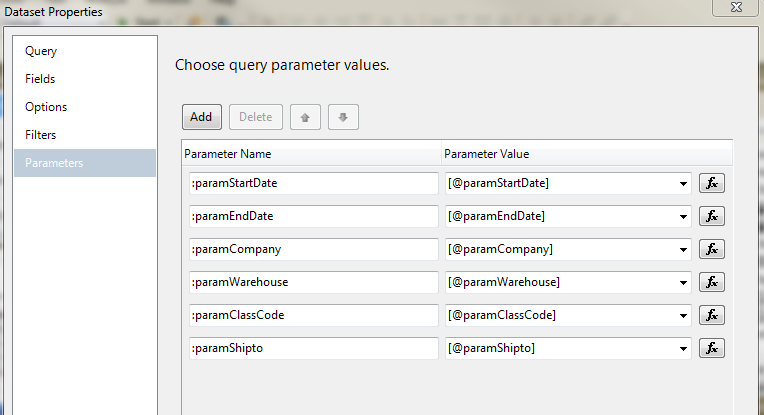I have come across an Oracle problem for which I have so far been unable to find the cause. The query below works in Oracle SQL developer, but when running in .NET it throws:
ORA-01008: not all variables bound
I've tried:
- Changing the Oracle data type for lot_priority (Varchar2 or int32).
- Changing the .NET data type for lot_priority (string or int).
- One bind variable name is used twice in the query. This is not a problem in my other queries that use the same bound variable in more than one location, but just to be sure I tried making the second instance its own variable with a different :name and binding it separately.
- Several different ways of binding the variables (see commented code; also others).
- Moving the bindByName() call around.
- Replacing each bound variable with a literal. I've had two separate variables cause the problem (:lot_pri and :lot_priprc). There were some minor changes I can't remember between the two. Changing to literals made the query work, but they do need to work with binding.
Query and code follow. Variable names have been changed to protect the innocent:
SELECT rf.myrow floworder, rf.stage, rf.prss,
rf.pin instnum, rf.prid, r_history.rt, r_history.wt
FROM
(
SELECT sub2.myrow, sub2.stage, sub2.prss, sub2.pin, sub2.prid
FROM (
SELECT sub.myrow, sub.stage, sub.prss, sub.pin,
sub.prid, MAX(sub.target_rn) OVER (ORDER BY sub.myrow) target_row
,sub.hflag
FROM (
WITH floc AS
(
SELECT flow.prss, flow.seq_num
FROM rpf@mydblink flow
WHERE flow.parent_p = :lapp
AND flow.prss IN (
SELECT r_priprc.prss
FROM r_priprc@mydblink r_priprc
WHERE priprc = :lot_priprc
)
AND rownum = 1
)
SELECT row_number() OVER (ORDER BY pp.seq_num, rpf.seq_num) myrow,
rpf.stage, rpf.prss, rpf.pin,
rpf.itype, hflag,
CASE WHEN rpf.itype = 'SpecialValue'
THEN rpf.instruction
ELSE rpf.parent_p
END prid,
CASE WHEN rpf.prss = floc.prss
AND rpf.seq_num = floc.seq_num
THEN row_number() OVER (ORDER BY pp.seq_num, rpf.seq_num)
END target_rn
FROM floc, rpf@mydblink rpf
LEFT OUTER JOIN r_priprc@mydblink pp
ON (pp.prss = rpf.prss)
WHERE pp.priprc = :lot_priprc
ORDER BY pp.seq_num, rpf.seq_num
) sub
) sub2
WHERE sub2.myrow >= sub2.target_row
AND sub2.hflag = 'true'
) rf
LEFT OUTER JOIN r_history@mydblink r_history
ON (r_history.lt = :lt
AND r_history.pri = :lot_pri
AND r_history.stage = rf.stage
AND r_history.curp = rf.prid
)
ORDER BY myrow
public void runMyQuery(string lot_priprc, string lapp, string lt, int lot_pri) {
Dictionary<int, foo> bar = new Dictionary<int, foo>();
using(var con = new OracleConnection(connStr)) {
con.Open();
using(var cmd = new OracleCommand(sql.rtd_get_flow_for_lot, con)) { // Query stored in sql.resx
try {
cmd.BindByName = true;
cmd.Prepare();
cmd.Parameters.Add(new OracleParameter("lapp", OracleDbType.Varchar2)).Value = lapp;
cmd.Parameters.Add(new OracleParameter("lot_priprc", OracleDbType.Varchar2)).Value = lot_priprc;
cmd.Parameters.Add(new OracleParameter("lt", OracleDbType.Varchar2)).Value = lt;
// Also tried OracleDbType.Varchar2 below, and tried passing lot_pri as an integer
cmd.Parameters.Add(new OracleParameter("lot_pri", OracleDbType.Int32)).Value = lot_pri.ToString();
/*********** Also tried the following, more explicit code rather than the 4 lines above: **
OracleParameter param_lapp
= cmd.Parameters.Add(new OracleParameter("lapp", OracleDbType.Varchar2));
OracleParameter param_priprc
= cmd.Parameters.Add(new OracleParameter("lot_priprc", OracleDbType.Varchar2));
OracleParameter param_lt
= cmd.Parameters.Add(new OracleParameter("lt", OracleDbType.Varchar2));
OracleParameter param_lot_pri
= cmd.Parameters.Add(new OracleParameter("lot_pri", OracleDbType.Varchar2));
param_lapp.Value = lastProcedureStackProcedureId;
param_priprc.Value = lotPrimaryProcedure;
param_lt.Value = lotType;
param_lot_pri.Value = lotPriority.ToString();
//***************************************************************/
var reader = cmd.ExecuteReader();
while(reader.Read()) {
// Get values from table (Never reached)
}
}
catch(OracleException e) {
// ORA-01008: not all variables bound
}
}
}
Why is Oracle claiming that not all variables are bound?

